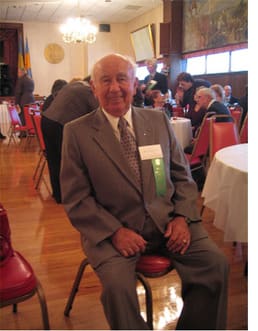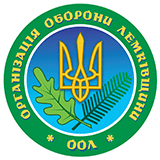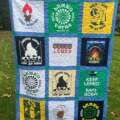
Heading the 27th National Conference of the Organization for the Defense of Lemko Western Ukraine (OOL) on September 23, 2006 in Yonkers, NY, Mrs. Marie Duplak highlighted in her opening remarks that the organization is celebrating its 70 th anniversary this year. In October 1933, a committee to help individuals in the Lemko region was first established in the U.S. and, in June 1936, this committee officially became the first official branch of OOL and the organization held its first national conference in Philadelphia, PA, Duplak said.
Duplak then directed the attention of the 27 th National Conference delegates to a copy of Lemkivshchyna magazine, which she is Editor-in-Chief of, to a published picture she found in the archives showing OOL’s 3 rd National Conference, held in 1960 in Passaic, NJ. She asked that any delegates present who also attended this conference in 1960 please stand up. Out of the 55 delegates in the room, three men stood up: Peter Rusynko, Julian Kotlar and Stefan Duplak.
In this way, the delegates of OOL’s 27 th National Conference acknowledged the organization’s past at the same time as they met for the purpose of discussing the direction of the organization’s work in the future.
“Everyone’s elated, because this is the most delegates we’ve had at a national conference. It shows that there’s a little life in the organization,” said Zenon Halkowycz, president of OOL.
The increase in delegates shows that OOL’s branches across the country are more active and interested in seeing what they can do to save the organization, as, paradoxically, the number of members in the organization is decreasing, Halkowycz added. The organization has 3,215 active national members, who support the organization through donations and other means, while approximately 10,000 “associate” members, who are on the fringe of the organization, exist overall throughout the U.S., he noted.
“It’s a significant drop in membership, because the original membership is dying off and new members are not joining, because they feel this is their ‘father’s organization’ and not their own,” Halkowycz said.
Peter Rusynko, one of the founding members of OOL’s branch in Yonkers, recollected how the organization used to function, stating that the members met more often and were more active when they were younger. Born in 1921 in the Lemko village of Petna, located today in southeastern Poland, Rusynko explained that he was forced to leave his home and go to Germany to work during World War II. Soon afterwards, his father was detained in the Jaworzno concentration camp, where the Polish government imprisoned citizens suspected of supporting the Ukrainian nationalist movement, and his mother and two siblings were forcibly relocated through the settlement campaign named “Akcja ‘Wisla’” in 1947. After the war, Rusynko eventually made his way to the United States, to Yonkers, where his brother had immigrated earlier, and helped organize OOL.
“Our goal was to help churches,” Rusynko said in Ukrainian about OOL’s work, explaining that the organization was not originally founded on purely political principles, but to help churches in the Lemko region that had been destroyed and repressed by the Polish government during and after World War II. OOL, for example, helped cover the church in Rusynko’s native village replace its old roof with a copper one, Rusynko noted.
With time, OOL’s activities expanded, from sending packages and small amounts of money to individuals in need in the Lemko region, to assisting Lemkos in western Poland and Ukraine who could not return back to their native land for various reasons, to using political pressure from the U.S. to push the Polish government for recognition of atrocities committed against Lemkos. (In resolutions which the delegates of the 27 th OOL National Conference developed during the day-long meeting, they vowed to continue to push for compensation of and the protection of the civic rights of Lemko-Ukrainians in Poland.) Rusynko’s dream, he said, is for the organization to survive and for a new generation to take over the work started 70 years ago.
During OOL’s 27 th national conference, representatives of the organization’s branches across the country described their work and activities during the last four years, since the last national conference in November 2002. They described the organization of picnics and dances to raise money for projects in the Lemko region, and ongoing cooperation with other Lemko organizations in Canada, Poland and Ukraine, and the building of a chapel in Ellenville, NY to remember the victims of Akcja “Wisla.”
The OOL delegates also held elections to the organization’s board. Elected for another term to the position of president was Zenko Halkowycz, who promised to pursue new projects, such as the creation of the organization’s website. Other members elected to OOL’s Executive Board included Steven Howansky (1 st Vice President), Zenon Wojtowycz (2 nd Vice President), Anna Wojtowycz (Secretary) and Stefan Kosciolek (Treasurer).
On April 28, 2007, OOL plans to participate in a conference remembering the 60 th anniversary of Akcja “Wisla,” Halkowycz noted. The conference, which will feature a choir performance, key-note speaker, and the draping of symbolic black sashes on Ukrainian flags, will be organized with the cooperation of other Ukrainian organizations, such as the Ukrainian Congress Committee of America (UCCA), and is scheduled to take place in New York City, Halkowycz said.
For more information about the Organization for the Defense of Lemko Western Ukraine, Inc. and its activities, please contact Diana Howansky, Press Secretary, at dhh2@columbia.edu or (212)854-4697.



